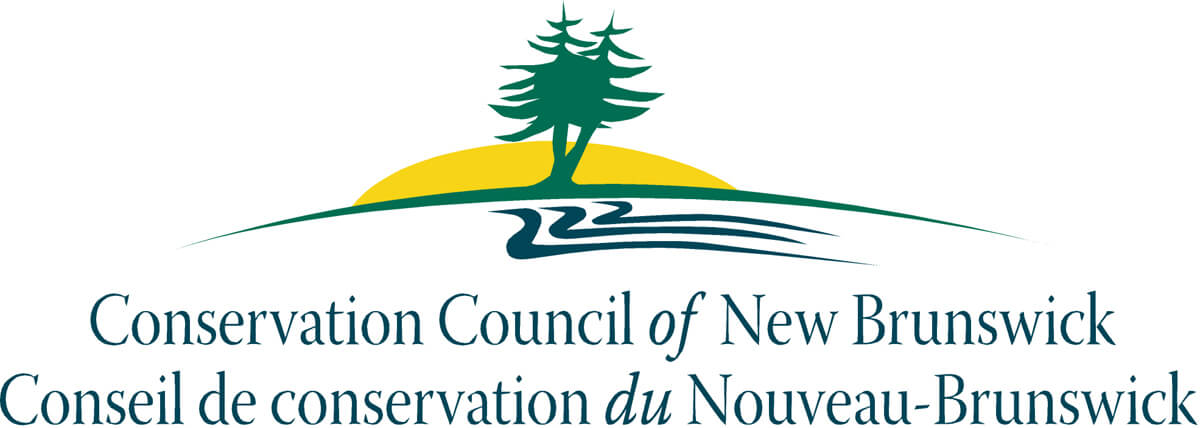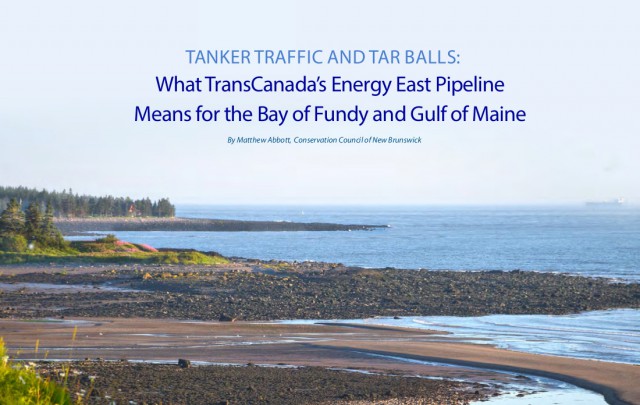
FOR IMMEDIATE RELEASE
Wednesday, Aug. 19, 2015
New Report Shows TransCanada’s Proposed Energy East Pipeline Project A Major Risk for the Communities of the Bay of Fundy-Gulf of Maine
FREDERICTON — The Conservation Council of New Brunswick today released a report on the risks to the Bay of Fundy and Gulf of Maine, one of the most productive and diverse marine ecosystems in the world, from TransCanada Corp.’s proposed Energy East Pipeline. Eighty per cent of the crude oil pumped through the pipeline would be destined for export. Saint John is currently the only export terminal included in the project, meaning the vast majority of oil would pass through the Bay of Fundy-Gulf of Maine ecosystem on an additional 115 to 290 tankers per year.
The report, entitled Tanker Traffic and Tar Balls: What TransCanada’s Energy East Pipeline Means for the Bay of Fundy and Gulf of Maine, examines the impacts the proposed bitumen pipeline would have on the marine environment and the 75 coastal communities in New Brunswick that depend on tourism and fisheries jobs along the Bay of Fundy.
“This report shows the Energy East pipeline would cause a stressed marine environment for whales, and an accident waiting to happen for thousands of New Brunswickers working in tourism and fisheries around the Bay of Fundy,” says Matthew Abbott, Fundy Baykeeper with the Conservation Council of New Brunswick and author of the report. He added, “A single tanker spill in the Bay of Fundy could devastate these two industries that have been the cornerstone of the economy in this region for generations. With this pipeline proposal, we’re gambling thousands of existing, permanent jobs for the prospect of short-term employment that will leave the Bay of Fundy at risk for the long term.”
The report makes a number of key findings, including:
- Noise from tanker traffic causes heightened levels of stress in the North Atlantic right whale, the most endangered large whale in the world, and impedes whales’ ability to communicate. Studies show whales are forced to ‘shout’ over tanker engines and are unable to communicate when noise reaches a certain level.
- Bitumen is likely to form into tarballs and sink when mixed with saltwater, which would spell disaster for many fisheries in the Bay of Fundy and Gulf of Maine, particularly the bottom-feeding lobster and scallop catches, the Bay of Fundy’s two most significant fisheries.
- The Bay of Fundy’s world-famous tides and thick fog present unique, difficult challenges to spill response efforts. Past oil spills in the bay have been lost in the fog, left to contaminate the marine environment.
- Fisheries in the Bay of Fundy support an estimated 5,000 jobs. The Bay’s international reputation as a relatively pristine marine environment would be irreparably damaged by an oil spill, impacting fisheries and tourism operators in New Brunswick, Nova Scotia and New England.
The report also offers recommendations to decision makers who will form the next federal government, including:
- Fisheries and Oceans Canada, with assistance from Transport Canada, should conduct an assessment of marine traffic noise in the Bay of Fundy to determine its impact and the potential impact of increased traffic noise on whales and other marine mammals;
- The provincial government should commission, with assistance from appropriate federal agencies, an independent assessment of the impact increased tanker traffic, noise and a bitumen spill would have on fisheries and tourism jobs in the Bay of Fundy;
- The Department of Fisheries and Oceans should work to create a coastal area management plan for the Bay of Fundy, which may include Marine Protected Areas and that takes into consideration thresholds for tanker traffic noise on the aquatic life, especially the North Atlantic right whale, an endangered species listed under the Canadian Species at Risk Act.
- The Department of Fisheries and Oceans and the Canadian Coast Guard should carry out an evaluation of its tanker accident and bitumen spill response capacity in the Bay of Fundy with respect to the bay’s unique characteristics, such as extreme tides and fog.
The Conservation Council of New Brunswick believes TransCanada’s Energy East pipeline proposal is not in the best interest of New Brunswickers.
“The ecological rarity and productivity of the Bay of Fundy rivals that of any other unique coastline — the people of New Brunswick and Maine, like the people of British Columbia, will not see it ruined and have their livelihoods threatened by more tankers or an oil spill,” says Lois Corbett, Executive Director of the Conservation Council of New Brunswick.
Web- and print-ready package containing report, infographic, and illustration
View an infographic summarizing the report
Matthew Abbott, Fundy Baykeeper with the Conservation Council of New Brunswick, is available for media interviews.
To arrange an interview, contact: Jon MacNeill, Communications Director, 458-8747 | 261-1353 | jon.macneill@conservationcouncil.ca
-30-

